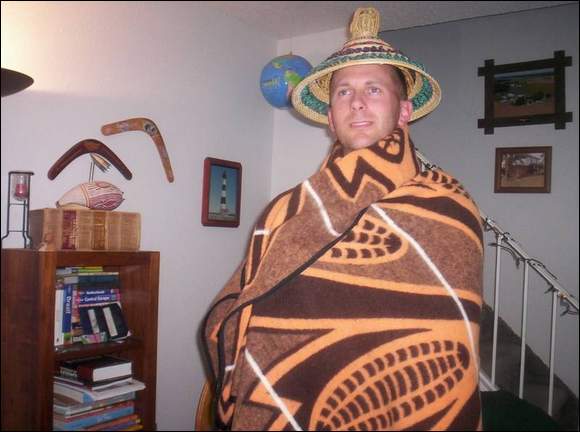
"Our goal was to help the residents make the most of what resources they have," Schmidt says. "Most people can only grow enough to feed themselves, if that. We tried to help them learn ways to optimize and fine-tune production methods, so maybe they'd have something to sell at market, or trade for something they needed."
More than two years and 12,000 miles separate Jean Brokish and Ben Schmidt from their Peace Corps days in the tiny mountain kingdom of Lesotho
St. Joseph couple recalls Peace Corps service experience overseas
KATE SHERIDAN
Tribune Correspondent
Caption: Leaving behind in Lesotho nearly all of his Western clothing was no sacrifice for Ben Schmidt, who said he consumed the 108-pounds goods-transport limit with items he'd never be able to acquire anywhere else, such as this ultra-soft, hand-woven, traditional Basothan coat and hat.Tribune Photos KATE SHERIDAN
ST. JOSEPH -- More than two years and 12,000 miles separate Jean Brokish and Ben Schmidt from their Peace Corps days in the tiny mountain kingdom of Lesotho.
The St. Joseph couple lives in a modern condominium now, instead of the 325-square-foot, stone-and-mortar rondeval home they shared in the little mountain valley where they lived while serving as agricultural advisers to a small Lesothan vocational school.
In St. Joseph, they've got access to many things that are unknown in Lesotho's struggling, drought-ravaged little villages: access to electricity, refrigeration, medical and dental care, communications, water and sewer services, paved roads and vehicles to drive.
But despite the time and distance and cultural gaps that separate them, the friends they made in Lesotho, they say, are never very far from their hearts.
"It's not easy to get current news of Lesotho, even with the Internet," notes Schmidt, a 32-year-old soil scientist with the Natural Resources Conservation Service. "But from what we've been able to discover, things still aren't good there. It's pretty bad, in fact."
Lesotho, once the British protectorate called Basotholand, is a land-locked region in extreme southern Africa in the shadows of the towering, cloud-shrouded Maluti Mountains. Neighbor to the Republic of South Africa and just the size of the state of Maryland, Lesotho is home to two million people from a single tribe called the Basotho, with most of them now living in "a constant state of crisis," Brokish adds.
A paradox of breathtaking beauty and heartbreaking poverty, Lesotho is a highly literate, culturally rich society, they say, where daily storms commonly produce double and even triple rainbows, but water scarcity and lack of water conservation keep the country in the relentless grip of earth-baking drought.
It's a place where adequate physicians and medical facilities are rare and undersupplied, and one out of every three residents is struck with HIV/AIDS.
And it's a place without viable industrial or commercial activity, where the vast majority of the residents rely on small, family gardens and subsistence farming to eke out a daily living, but tractors are almost nonexistent, farming practices are ill-advised at best, and one of every four residents can't get enough to eat.
That's where Brokish and Schmidt came in, some four years ago.
"Joining the Peace Corps was always a goal of mine," says Brokish, who's now the Land Preservation Specialist for the nonprofit Chikaming Open Lands. She grew up on a dairy farm in Dodgeville, Wis., studied plant sciences at the University of Wisconsin-River Falls, and then went on to Purdue University in 1996 to get her master's degree in soil science.
That's where she met fellow graduate student Ben Schmidt, a student of soil biology who was raised on a grain, beef and pork farm in Effingham, Ill. He'd studied natural resource management at North Carolina State University in Raleigh before heading to Purdue with an eye on a master's degree and a career in soil science education.
About two years after their graduations, marriage and a new life working in the Van Wert (Ohio) Soil and Water Conservation District, the couple put their comfortable home up for sale and started looking for an opportunity to share their knowledge and skills with the Peace Corps.
"Because we were married, it actually took longer for the Peace Corps to find a place for us," Brokish adds. "We applied, and then it took about a year before they placed us in Lesotho."
Little mud-hut villages of 300-400 people dot the landscape of the semi-arid western "lowlands" where most of the country's people live. The country touts itself as the world's highest elevation country, because no spot in Lesotho is below 5,000 feet above sea level. Brokish and Schmidt settled into their lodgings "and it was literally all uphill from there," Schmidt says.
Their round stone home was among the most modern in the region, boasting running water, which was not enjoyed by any of the other huts. No one had electricity, and the pair usually used a cloth bag to keep perishables cool. Lesotho's elevation and latitude ensures a four-season climate, and many nights, even in summer, were cool enough to keep most food items.
They used primarily dried milk products and rarely ate meat, Brokish said.
"Our goal was to help the residents make the most of what resources they have," Schmidt says. "Most people can only grow enough to feed themselves, if that. We tried to help them learn ways to optimize and fine-tune production methods, so maybe they'd have something to sell at market, or trade for something they needed."
The Basotho are quick learners and have a high respect for education, they say. "There is no free education," Brokish notes. "It's pay-as-you-go. Sometimes there are 80 students in a single classroom. And there's no industry, so even for those who become educated, there's very little work, except on the farm."
With the Peace Corps assignment, Brokish and Schmidt set to work teaching the Basotho such fundamental farming practices as mulching, crop rotation, fertilization and drip irrigation.
Schmidt and Brokish began immediately to set up their own garden -- lots of vegetables such as peas, tomatoes, beans, lettuce and including flowers, which weren't cultivated for either beauty or food before they arrived, Brokish notes.
Much of their educational effort over the next two years involved re-teaching the people some of the basic self-sufficient techniques the Basotho had actually practiced generations ago, Brokish says, before international intervention that "turned out to be more of a detriment than a help," she notes.
With the region gripped by drought and receiving just 20 inches of rain a year, Schmidt focused a lot of his efforts on teaching water harvesting techniques, he says.
"When it pours down in the afternoons, it rains so hard and fast that the water doesn't have a chance to be absorbed into the earth," he says. "So I pushed hard for water harvesting, rain barrels and cisterns and water that could be used for simple drip irrigation systems.
Surrounded by the friendly and welcoming Basotho, Schmidt and Brokish say the biggest challenges of spending two years in a foreign culture aren't physical, but psychological.
"We walked everywhere, except when we had to go into Maseru," the nation's city and capital, Schmidt says. "That wasn't bad at all. What was frustrating was the waiting. You wait for everything. You have to learn to adapt or you'll never make it through the experience."
The experience begins at the river's edge, where a single, rickety and often leaking rowboat carries passengers on the first leg of their journey. Brokish took snapshots of the locals carefully -- and typically, she said -- using small white buckets to bail river water out of the boat-bottom.
Once across the river, there are makeshift buses that travel across dirt roads, and the "taxi service" that takes people into Maseru is a 15-passenger van.
"And it doesn't start until there are 15 passengers in the van, no matter what," Brokish recalls. "It could take an hour, or three hours, or six hours, it doesn't matter. The van leaves when it's full. That's the way it is."
Once in town, "you wait five hours in line to do your banking," she adds. "It's not an exaggeration. There's only one, maybe two, banks in the whole region. You just learn that if you're going to do your banking today, then that's all you're going to do today."
To avoid a dramatic transition back to fast-paced, fully convenient American life, the couple spent three months returning home to the United States, touring the south African countries, New Zealand, Australia, Asia and Hawaii before hitting the mainland.
"The Peace Corps was a very good experience for us. We might go again," Brokish says, with a glance at her husband. "I think if we go back to Lesotho, though, it will be as individuals, just to visit, to see how things are going."
Schmidt nods.
"One of the last projects I was working on before we left was a community pond," he says. "We were hoping to grow and harvest fish in there eventually. I hope that worked out because they could really use it. I'd like to see how that's doing these days."

















